
ICAS Bulletin (online ISSN 2836-3418, print ISSN 2836-340X) is published every other week throughout the year at 1919 M St NW, Suite 310, Washington, DC 20036.
The online version of ICAS Bulletin can be found at chinaus-icas.org/bulletins/.
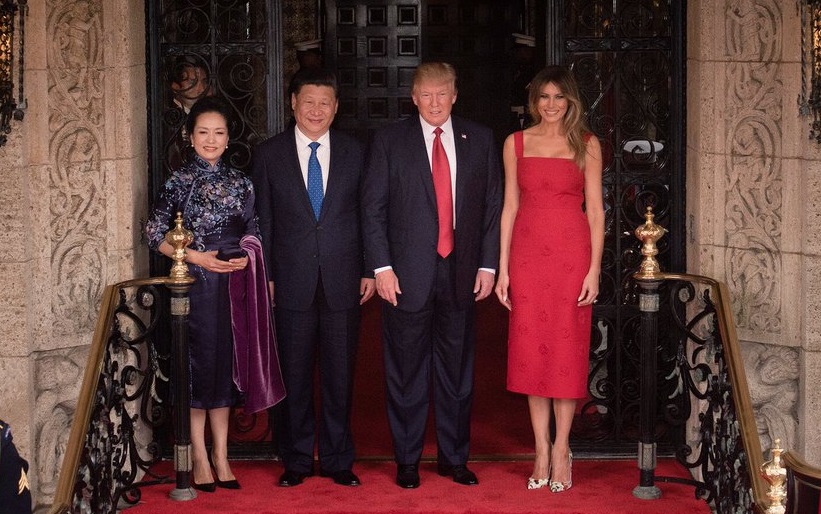
– Speaking at a forum in Beijing, China’s Foreign Minister Wang Yi urged cooperation with the incoming Trump administration, while Trump has been signaling a tougher stance with higher tariffs and hard-line appointments, setting the stage for renewed tensions.
– President Xi Jinping expressed a willingness to work with President-elect Donald Trump to manage trade tensions, calling for dialogue over confrontation in a letter to The US-China Business Council. While Beijing signals cooperation, experts are noting China’s commitment to defending its interests as both sides navigate potential economic conflicts.
– Despite receiving an informal invitation from President-elect Trump, Chinese President Xi Jinping is reportedly unlikely to attend Donald Trump’s inauguration, but may send a senior official instead.
– Senior U.S. Treasury officials are engaging in final economic talks with Chinese counterparts in Nanjing and at a G20 meeting in South Africa, aiming to maintain communication channels amid escalating trade tensions. With President-elect Trump signaling a more confrontational approach, the Biden administration hopes its dialogue framework will stabilize the tense economic relationship.
– U.S. President Joe Biden approved a classified memo to guide Trump’s administration in addressing growing ties among China, Russia, Iran, and North Korea. Recommendations include enhanced interagency cooperation, faster intelligence sharing with allies, and refined use of sanctions to counter adversarial threats.
– President-elect Donald Trump has nominated former Georgia Senator David Perdue, a seasoned businessman with extensive experience in Asia, to become the next U.S. Ambassador to China.
Associated News References:
“China, Trump Talk Up Prospects For US-China Collaboration,” Reuters, December 17
“China Signals Readiness To Mend Ties With U.S. Ahead Of Trump Inauguration,” CNBC, December 13
“Trump’s Inauguration Won’t Have Xi Jinping Among the Guests,” The Wall Street Journal, December 12
“Biden Administration Looks To Reinforce U.S.-China Ties Ahead Of Trump’s Return,” The New York Times, December 11
“Biden Approves National Security Memo On China, Iran, North Korea And Russia Ahead Of Trump’s Return,” ABC News, December 11
“Trump To Nominate Former Georgia Sen. David Perdue As Ambassador To China,” The Wall Street Journal, December 6
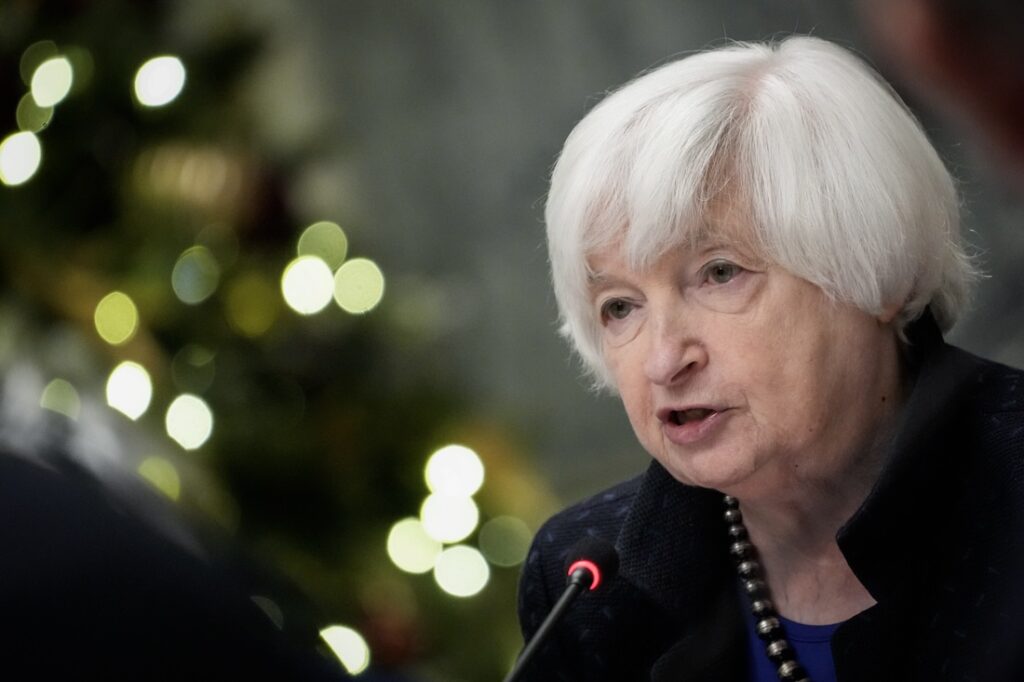
– On December 17, China’s National Immigration Administration announced an extension of its visa-free transit policy that, effective immediately, will allow citizens from the U.S. and 53 other countries to visit China for up to 10 days without a visa.
– Walmart has partnered with Chinese delivery giant Meituan to expand its e-commerce presence in China, making its products available on Meituan’s app. The move follows Walmart’s earlier $3.6 billion sale of its JD.com stake and aligns with its efforts to grow in a market where e-commerce accounts for nearly half its sales.
– The Biden administration extended and updated a five-year U.S.-China Science and Technology Agreement, ensuring guidelines for research collaboration while addressing national security concerns. The revised pact aims to balance scientific cooperation with safeguards on intellectual property and transparency despite U.S. Republican opposition warning it could benefit China in strategic technologies.
– U.S. Treasury Secretary Janet Yellen urged the next administration to preserve U.S.-China economic talks, emphasizing their importance for addressing shared challenges and avoiding escalations. As Yellen prepares for the final rounds of bilateral financial and economic discussions, she highlighted the need for open channels amid rising tensions with Beijing.
– The U.S. National Basketball Association (NBA) announced a multiyear agreement to hold preseason games in Macau starting in 2025, with the Brooklyn Nets and Phoenix Suns set to play in the inaugural matches. The move is being regarded as a cautious test to repair relations after a 2019 controversy led to the suspension of NBA activities in Mainland China.
Associated News References:
“Americans Can Skip A Visa To Visit China For Up To 10 Days, But There’s A Twist,” USA Today, December 18
“Walmart Collaborates With Meituan To Boost China E-Commerce Sales,” The Wall Street Journal, December 17
“Biden Administration Signs Modified Science Pact With China,” The Wall Street Journal, December 13
“US-China Economy Talks Resume As Yellen Urges Maintaining Links,” Bloomberg, December 11
“NBA’s Diplomatic Playbook Opens An Opportunity In China,” The Wall Street Journal, December 6
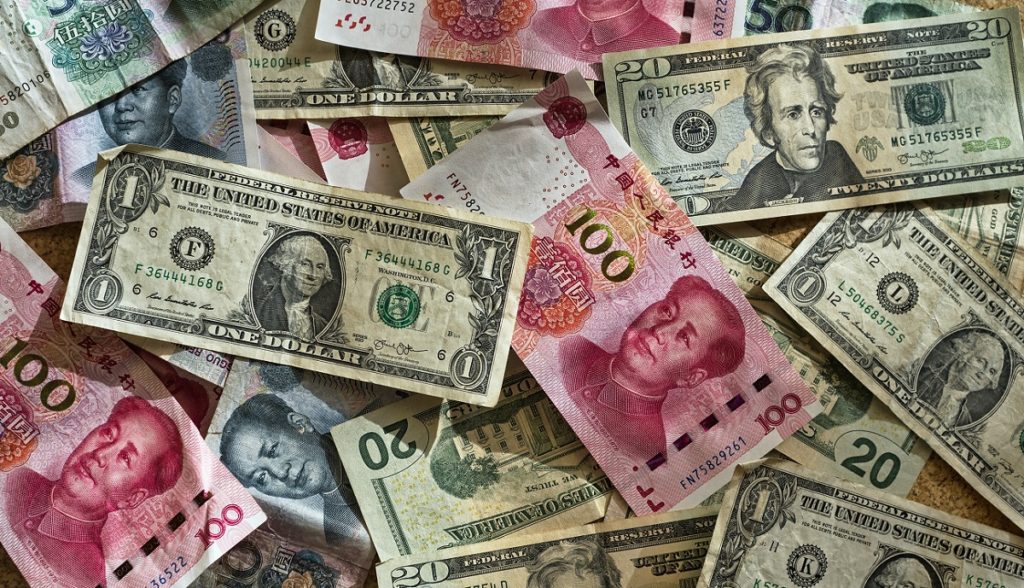
– The Biden administration is launching a Section 301 trade investigation into China’s subsidized production of older-model semiconductors, citing national security concerns and the threat to U.S. and allied chipmakers from cheap, oversupplied Chinese chips.
– China’s policymakers are debating allowing the yuan to weaken in 2025 as a response to Donald Trump’s proposed tariffs, which could reach 60% on Chinese imports. While a weaker yuan could support exports and economic growth, experts warn that aggressive currency devaluation risks sparking global backlash and further trade restrictions.
– China has initiated an anti-monopoly investigation into Nvidia, citing potential violations tied to its 2020 Mellanox acquisition. The U.S. company is facing increased scrutiny as Beijing pushes for local alternatives and ramps up restrictions on critical minerals to counter U.S. sanctions.
– Chinese President Xi Jinping cautioned the U.S. against reigniting trade conflicts, emphasizing “no winners” emerge from tariff or technology wars. Amid U.S. export restrictions and Trump’s proposed tariff hikes, Xi reaffirmed China’s commitment to defending its economic interests while highlighting the global importance of its growth.
– China’s Politburo announced plans to adopt an “appropriately loose” monetary policy and increase fiscal spending in 2025 to counter deflation and potential U.S. tariffs under Donald Trump. The unprecedented policy shift prioritizes growth over debt risks, with a focus on boosting consumption and high-tech industries rather than traditional infrastructure.
– Chinese carmakers like BYD are rapidly expanding in Mexico, leveraging low-cost electric vehicles like the Dolphin Mini to capture market share and challenge traditional automakers. While high U.S. tariffs currently block direct entry, Mexico remains in a strategic position as a manufacturing hub.
Associated News References:
“Biden Prepares To Target Chinese Legacy Chips With Trade Investigation,” The New York Times, December 16
“Exclusive: Chinese Authorities Are Considering A Weaker Yuan As Trump Trade Risks Loom,” Reuters, December 11
“China Targets Nvidia With Antitrust Probe, Escalates US Chip Tensions,” Reuters, December 10
“‘No Winners’: China’s Xi Warns US Against A Trade War,” CNN Business, December 10
“China Ready To Go Deeper Into Debt To Counter Trump’s Tariffs,” Reuters, December 10
“Chinese Carmakers Are Taking Mexico by Storm While Eyeing U.S.,” The New York Times, December 9
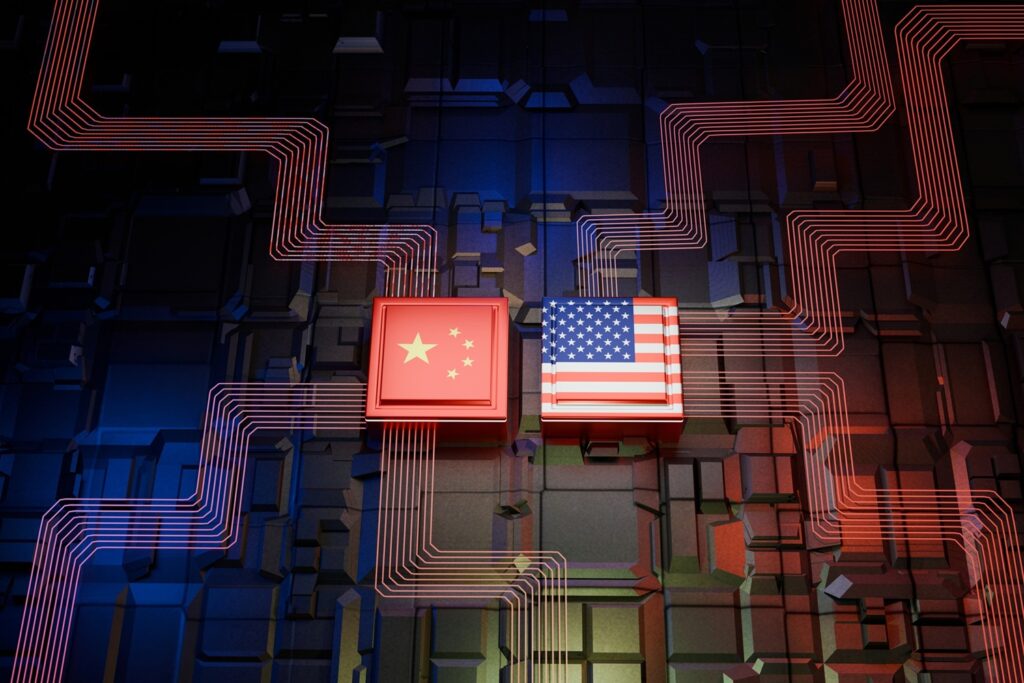
– After a U.S. federal appeals court in early December rejected TikTok’s attempt to overturn the law that will require TikTok to be sold or banned in the US effective January 19, the U.S. Supreme Court has allowed TikTok and its parent company ByteDance to bring forward its case to the Supreme Court on January 10.
– Within the coming days, the U.S. Congress is expected to vote on a government funding legislation that also includes a bill that would expand restrictions on U.S. investment in China, expanding on finalized rules released by the U.S. Department of the Treasury in October 2024.
– The U.S. plans to impose new restrictions on AI chip exports, capping shipments to certain regions to limit China’s access to advanced computing power. The rules, targeting GPUs and AI infrastructure, aim to block backdoor acquisitions but risk straining ties with countries eager to develop their AI ecosystems.
– The U.S. sanctioned Sichuan Silence Information Technology and charged employee Guan Tianfeng with hacking over 80,000 firewalls globally, including critical American infrastructure, in 2020. Guan, location currently unknown, exploited a vulnerability in Sophos firewalls to steal data and deploy ransomware.
– House China Select Committee Chair John Moolenaar slammed new Biden administration export controls targeting China’s chipmaking industry, arguing that licensing exceptions for firms like Huawei and SMIC undermine national security. Moolenaar also urged Commerce officials to preserve documents for review by the incoming Trump administration.
– U.S.-based Nvidia is in talks with Taiwan-based TSMC to produce its Blackwell AI chips at TSMC’s Arizona facility, which is set to begin operations in 2024. While chip production would occur in Arizona, essential packaging would still take place in Taiwan, reflecting TSMC’s continued reliance on its CoWoS capacity overseas.
Associated News References:
“US Supreme Court to hear TikTok challenge to potential ban,” BBC, December 18
“Congress to vote on new restrictions on U.S. investment in China,” CNBC, December 17
“U.S. Prepares New AI Chip Restrictions To Close China’s Backdoor Access,” The Wall Street Journal, December 13
“China Cybersecurity Firm Sanctioned, Employee Charged By US,” Bloomberg, December 11
“GOP China Panel Chair Slams US Chip Curbs For Huawei ‘Loopholes’,” Bloomberg, December 5
“Exclusive: TSMC In Talks With Nvidia For AI Chip Production In Arizona, Sources Say,” Reuters, December 5

– In a recently released Annual Report to Congress on China’s military, the U.S. Department of Defense says that China, over the last year, has expanded its nuclear forces, intensified its military presence around Taiwan, and strengthened its ties with Russia. It also opines that its overall modernization and growth has been harmed by a recent string of corruption allegations in military leadership.
– On December 10, China’s Foreign Ministry announced new visa restrictions on certain U.S. personnel who it said had “behaved badly” on and “interfered” in Hong Kong-related issues.
– China has limited exports of key drone components to the U.S. and Europe, affecting critical supply chains, with broader restrictions expected in 2025. The move, seen as retaliation against recent US semiconductor curbs, impacts Ukraine’s war effort and spurs Western nations to secure alternative suppliers.
– China sanctioned 13 U.S. defense firms, including BRINC Drones, and six executives in retaliation for a $387 million Taiwan arms package approved by the Biden administration.
– Upon the activation of the first U.S. Space Force unit in Japan, located at Yokota Air Base near Tokyo, the commander of the U.S. Space Forces Indo-Pacific cited threats to regional stability from Russia, China, and North Korea. The new base aims to enhance missile warning and space surveillance.
– U.S. Ambassador to the Philippines MaryKay Carlson accused Beijing of endangering lives and disrupting lawful Philippine maritime operations after Chinese coast guard and navy vessels were reported firing water cannons and blocking Philippine patrol ships at Scarborough Shoal.
Associated News References:
“China Has Expanded Its Nuclear Force And Strengthened Ties To Russia, The Pentagon Says,” AP News, December 18
“China Announces Visa Restrictions On US Personnel Over Hong Kong ‘Interference’,” Reuters, December 10
“China Is Cutting Off Drone Supplies Critical To Ukraine War Effort,” Bloomberg, December 9
“China Slaps Sanctions On 13 U.S. Defense Firms,” The New York Times, December 5
“US Opens New Space Base On Doorstep Of Russia, China And North Korea,” Newsweek, December 4
“U.S. Accuses China Of Illegal, “Dangerous Maneuvers” As Philippine Vessels Blasted With Water Cannons,” CBS News, December 4
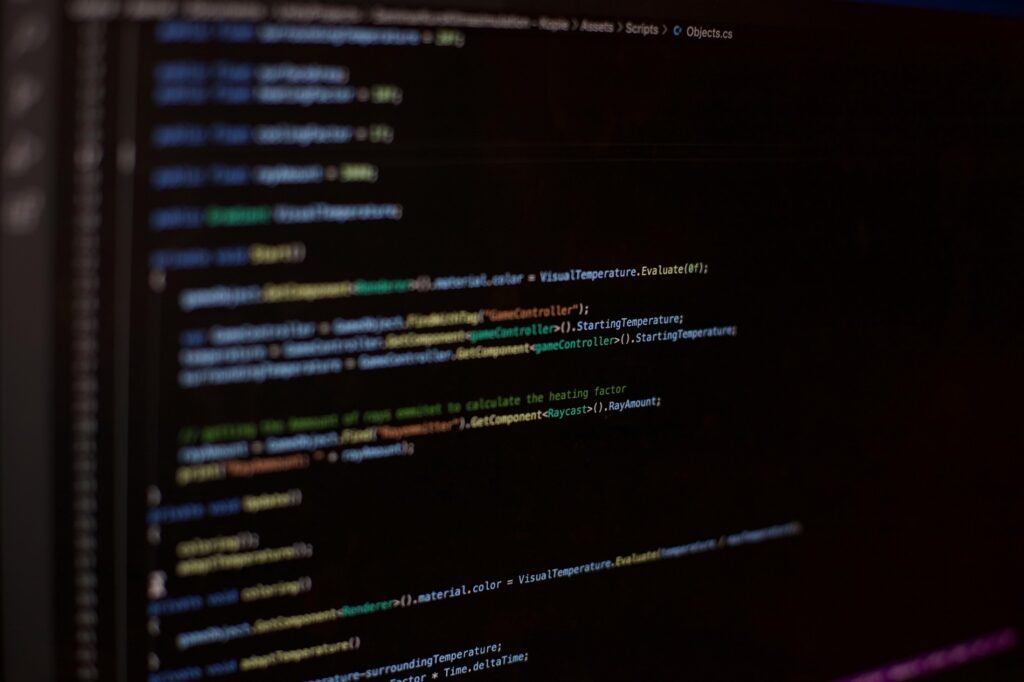
“U.S. Weighs Ban on Chinese-Made Router In Millions Of American Homes,” The Wall Street Journal, December 18
“Biden Administration Takes First Step To Retaliate Against China Over Hack,” The New York Times, December 16
“Taiwan In Talks With Amazon’s Kuiper On Satellite Communications Amid China Fears,” Financial Times, December 17
“Exclusive: Yellen Won’t Rule Out Sanctions On Chinese Banks, Curbs On ‘Dark Fleet’ Oil Tankers,” Reuters, December 13
“China Says US Politicians Need To Be More Rational After Senator’s Call For Garlic Probe,” Reuters, December 13
“Joe Biden To Hit Chinese Cleantech Imports With More Tariffs,” Financial Times, December 11
“Pacific Islands Wait For Trump, Wary Of Climate And China Stance,” Reuters, December 10
“Trump’s Return Casts A Shadow Over China’s Success In US Solar Sector,” Financial Times, December 10
“Five Years Since Its Inception, A US Development Agency Competes With China On Global Projects,” ABC News, December 9
“Dozens Of Countries Hit In Chinese Telecom Hacking Campaign, Top U.S. Official Says,” The Wall Street Journal, December 4
Recordings for the ICAS 2024 Annual Conference are now available for viewing on the ICAS YouTube page!
On Thursday, December 12, 2024, ICAS hosted its 2024 Annual Conference in-person at the Georgetown Marriott Hotel in Washington, D.C. This year’s conference, subtitled “Trump 2.0: Will U.S.-China Relations Prosper, Suffer or Muddle Through?” and concurring with ICAS’ 10th Anniversary, included a Keynote, four expert panels and a Luncheon Speech. We are grateful to all of our expert participants and supporters who helped make this year’s conference both productive and engaging!
Stay tuned for more Annual Conference content.
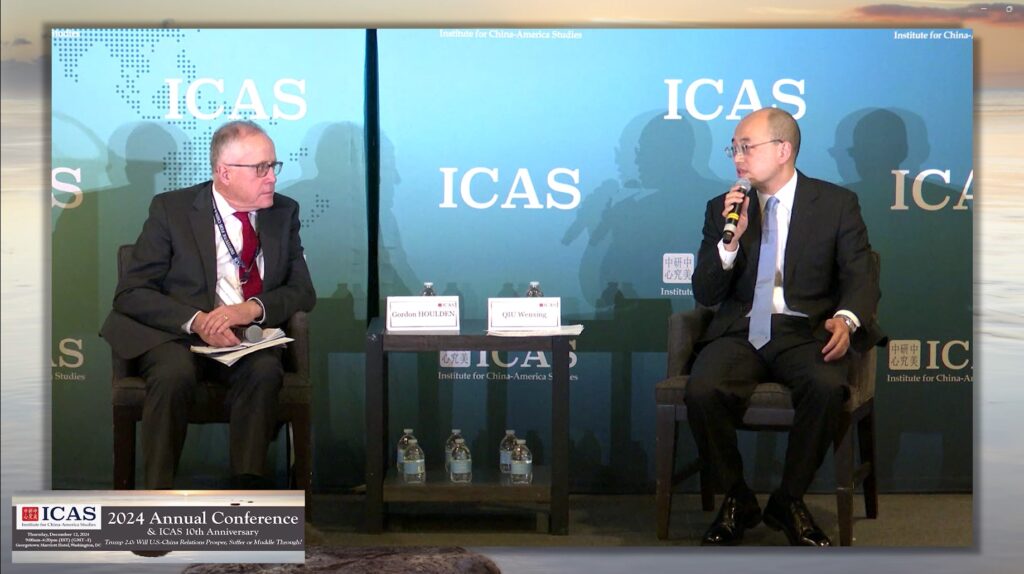
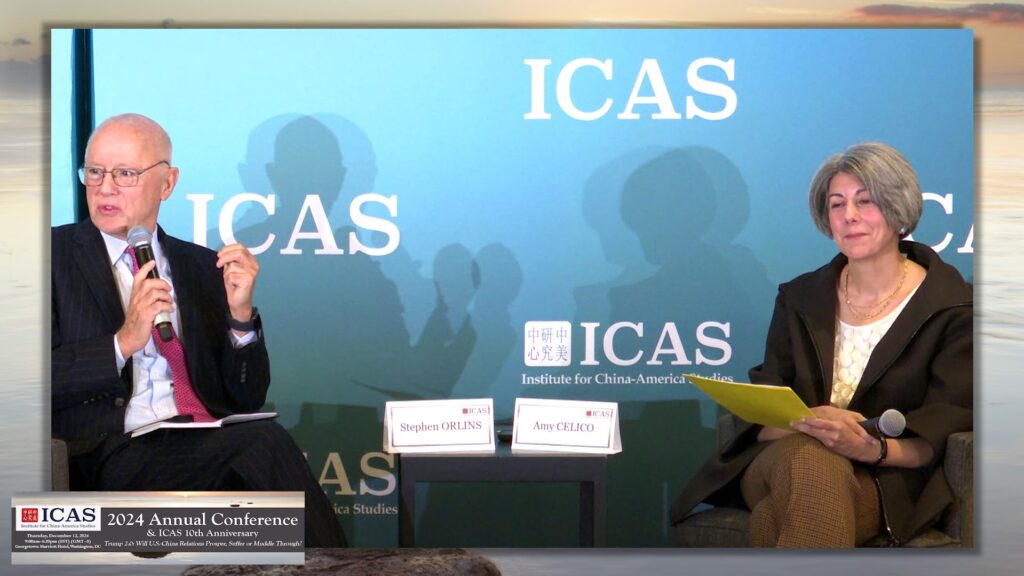
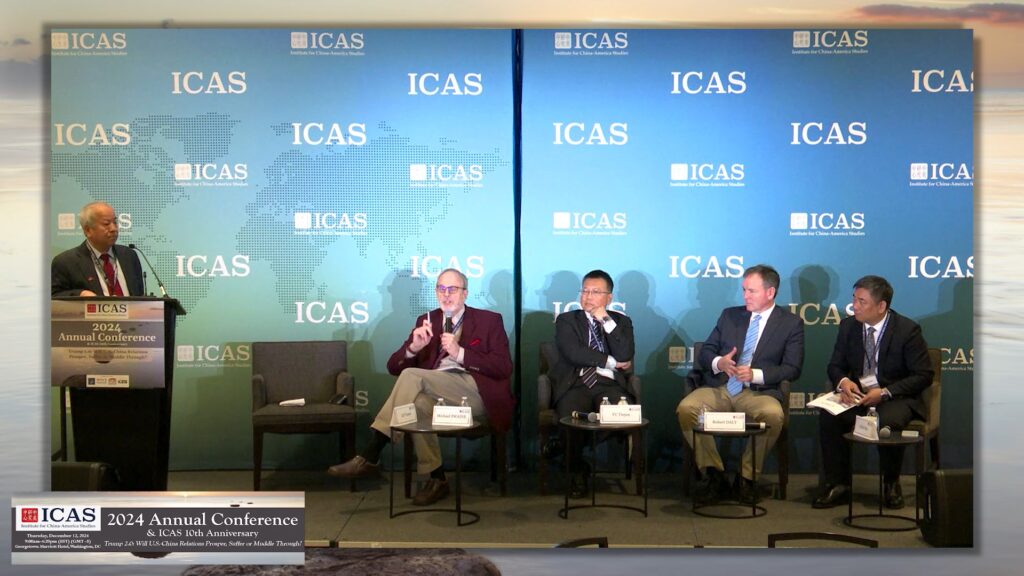
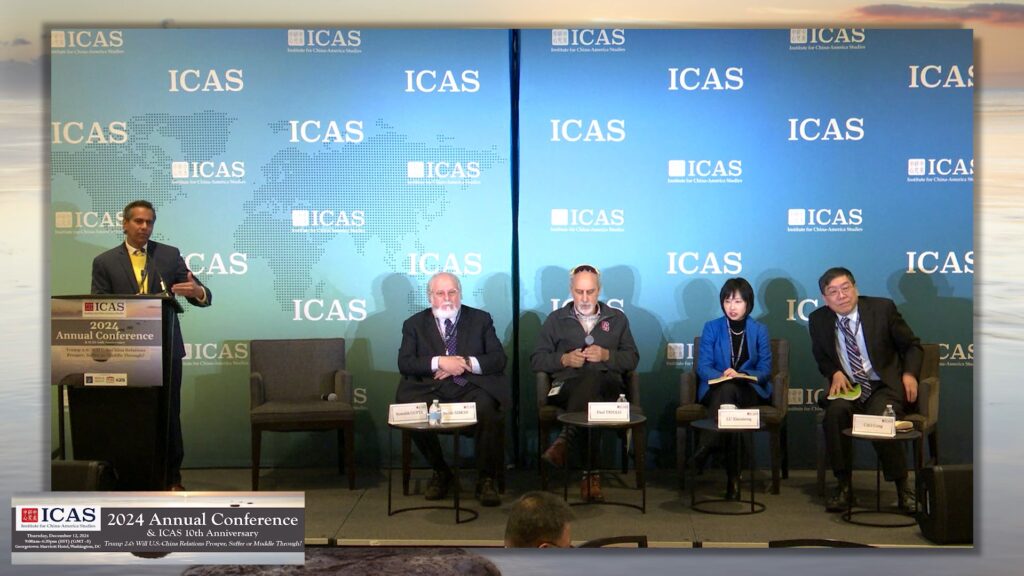
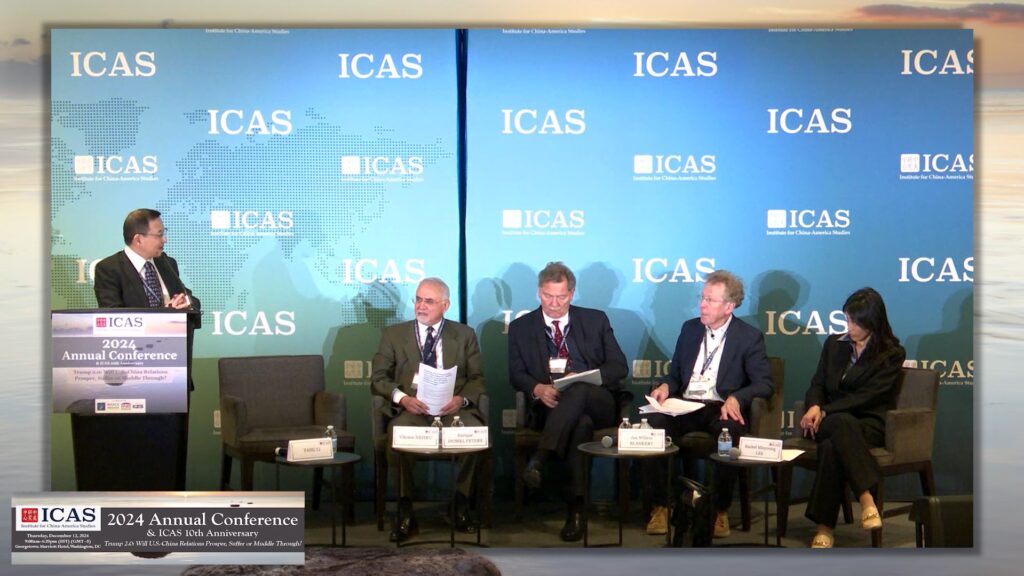
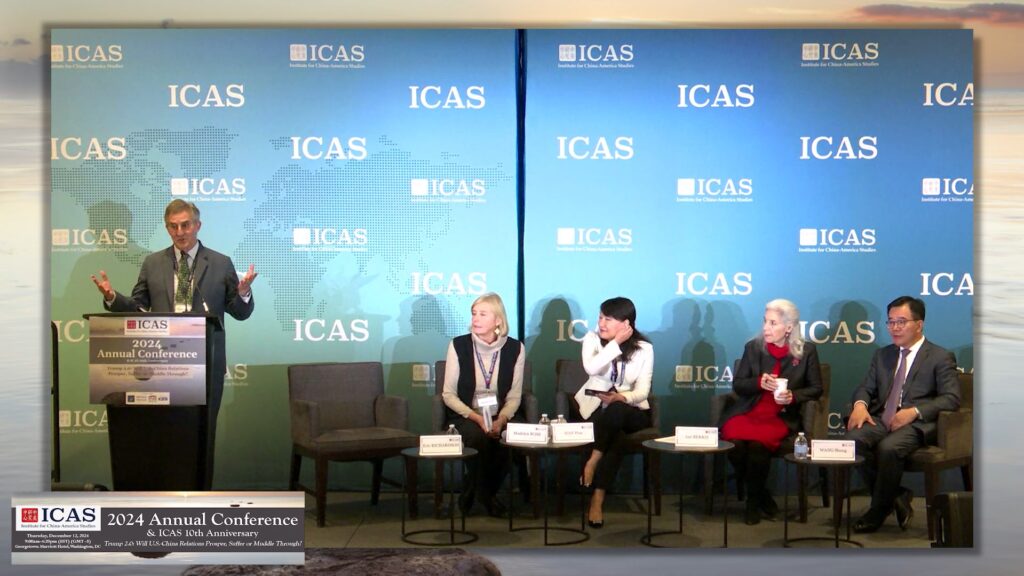
Dr. Nong Hong participates in the Symposium on Global Maritime Cooperation and Ocean Governance 2024
November 26, 2024
Sanya, China
Dr. Nong Hong, ICAS Executive Director participated in the Symposium on Global Maritime Cooperation and Ocean Governance (GMCOG) 2024 held in Sanya, China on November 26, 2024. Dr. Nong Hong gave a presentation in Session 6: “The future of the Poles and the Deep Sea” titled “Reflection on the 2024 Arctic Circle Assembly: Charting the Future of Arctic Governance.”
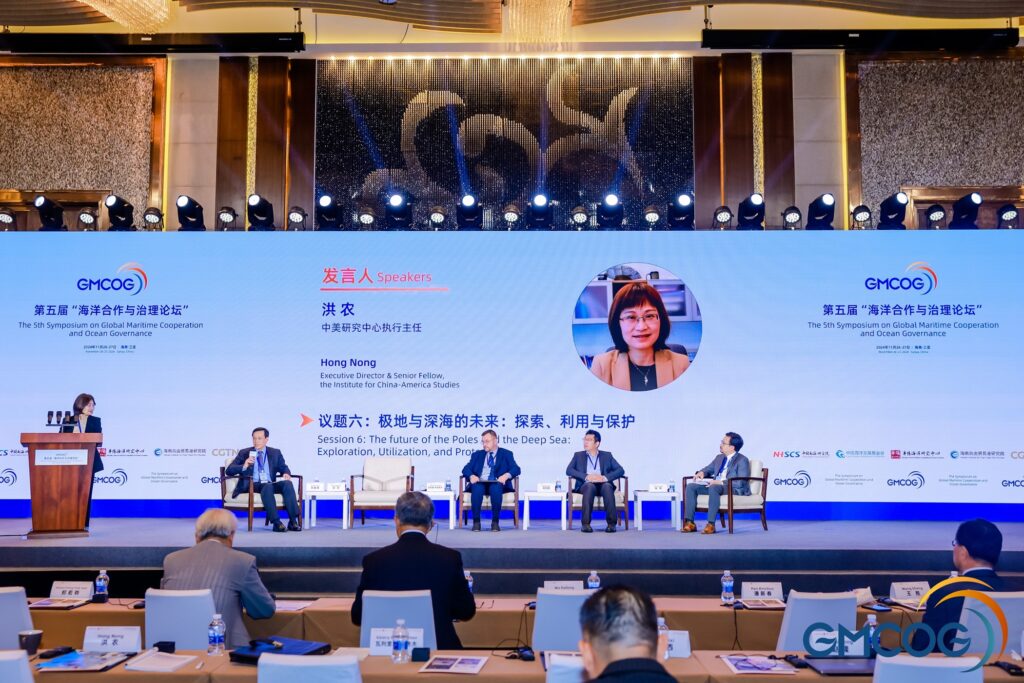
L.E.A.D. Project Brief: Trump’s Return Scrambles Outlook
By Sourabh Gupta
December 16, 2024
Introduction:
US-China relations through 2024 remained marked by a paradox. On the one hand, ties displayed a distinct stabilization. The two sides translated their leaders’ modest “San Francisco Vision” into reality. Cabinet officials and the numerous working groups met in earnest and produced outcomes, functional cooperation was deepened though differences emerged, sensitive issues were carefully managed, and effort was devoted to improving the relationship’s political optics. US electoral politics, or threat of Chinese interference in the elections, did not materially impinge on ties. On the other hand, the negative tendencies in US-China relations deepened. With its time in office winding down, the Biden administration went into regulatory overdrive to deepen the “selective decoupling” of the two countries’ advanced technology ecosystems. China methodically responded in kind using its now-robust economic lawfare toolkit. The chasm in strategic perceptions remained just as wide. Donald Trump’s return to the Oval Office portends a period of disruptive unpredictability in ties, although “Tariff Man” Trump can reliably be expected to enact additional impositions on Chinese imports.
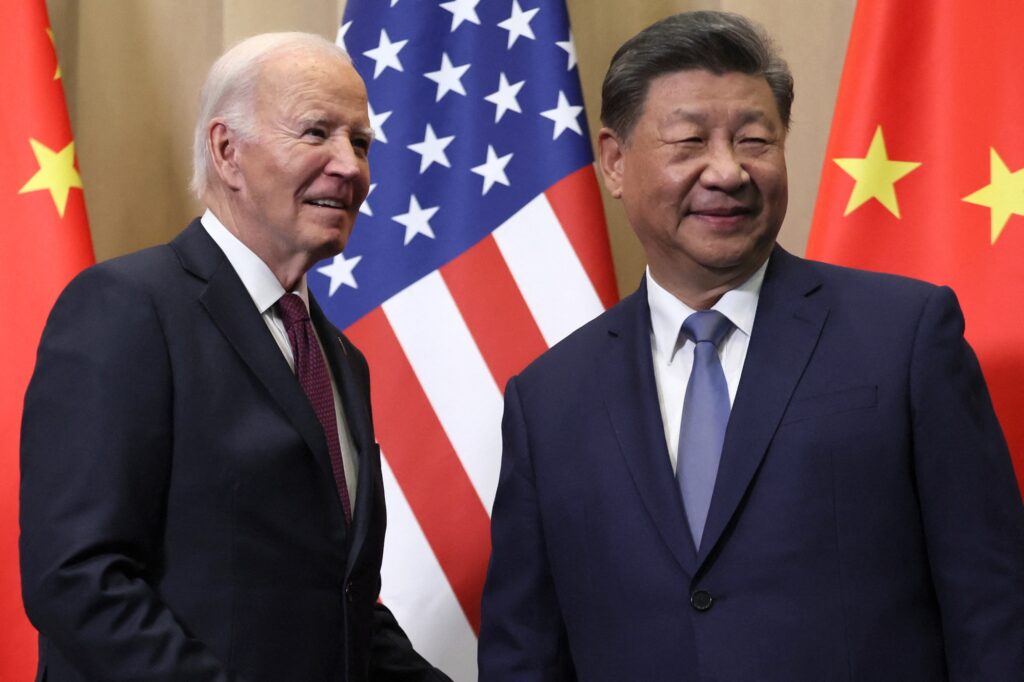
This article is extracted from Comparative Connections: A Triannual E-Journal of Bilateral Relations in the Indo-Pacific, Vol. 26, No. 2, December 2024. Preferred citation: Sourabh Gupta, “US-China Relations: Trump’s Return Scrambles Outlook,” Comparative Connections, Vol. 26, No. 2, pp 39-58.
The Institute for China-America Studies is seeking two research assistant interns for Spring 2025!
The Institute for China-America Studies is seeking two research assistant interns for Spring 2025! The internship will run from mid-January through mid-May. This is a part-time, 20 hour per week internship that will primarily be conducted in-person at the ICAS office in Washington, DC.
Competitive candidates will have an interest in U.S.-China relations and are pursuing a bachelor’s degree from an accredited institution, though those pursuing a relevant master’s degree will also be considered. We are looking for team-oriented problem solvers who can think on their feet, be detail-oriented, and are eager to improve their professional skills. Candidates with previous research experience at a think tank or in a similar field are preferred but not necessary. Native-level fluency in English is required and intermediate-level fluency in Mandarin or another foreign language is preferred.
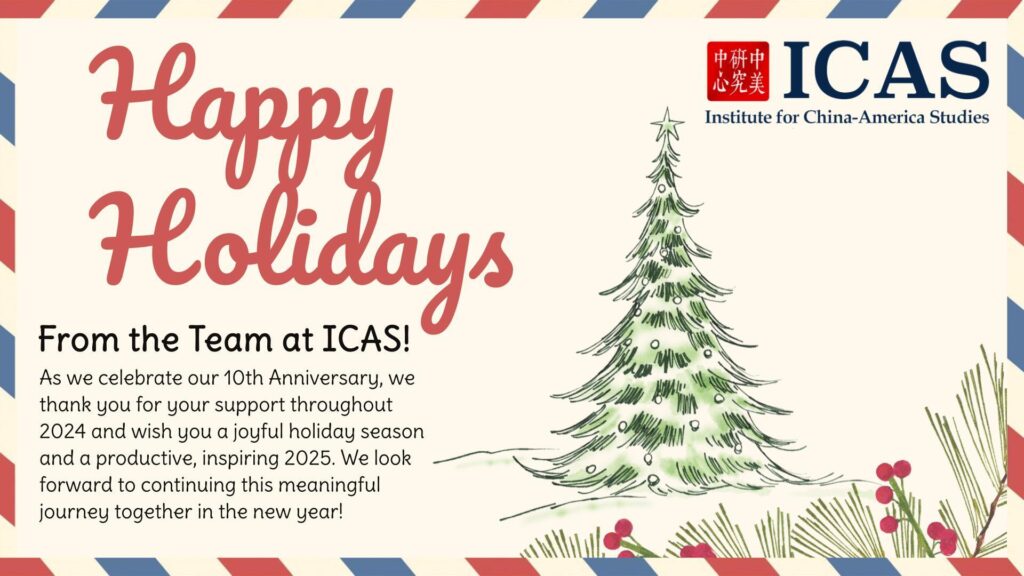
Trade wars are neither good nor easy to win
By Sourabh Gupta
December 17, 2024
Donald Trump’s initiation of a trade war with China in 2018 led to a decline in China’s share of US imports, but China’s global trade share and importance to the global economy increased. Despite attempts to diversify supply chains away from China and a surge in protectionist sentiment, China’s diverted — not reduced — trade suggests that the conflict was counterproductive. Further confrontations increasingly isolate the United States within the multilateral trading system.
This commentary was originally released by EastAsiaForum on December 17, 2024.
On Sunday, December 15, 2024, Senior Fellow Sourabh Gupta was quoted by South China Morning Post on China’s difficulty in building its connections with the Trump transition team.
On Sunday, December 15, 2024, Distinguished Fellow Denis Simon was quoted by China Daily on the renewal of the U.S.-China Science and Technology Agreement.
On Friday, December 6, 2024, Senior Fellow Sourabh Gupta was interviewed by CGTN America’s The World Today on the botched martial law declaration in South Korea and its fallout.
On Wednesday, December 11, 2024, Senior Fellow Sourabh Gupta was interviewed by CGTN America’s Global Business on the recent US Appeal Court Ruling upholding the forced divestiture or ban of TikTok.
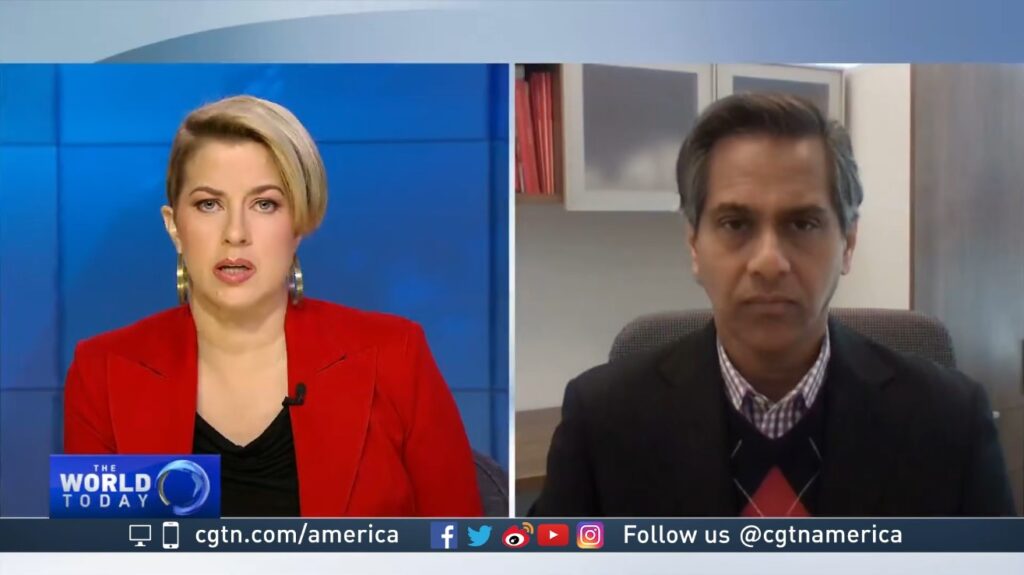
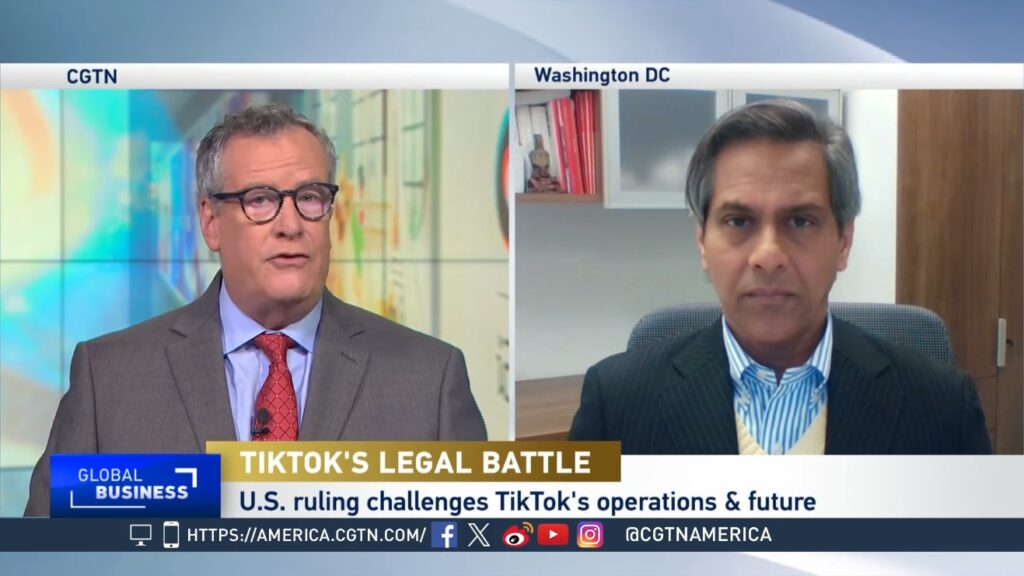

The Institute for China-America Studies is an independent nonprofit, nonpartisan research organization dedicated to strengthening the understanding of U.S.-China relations through expert analysis and practical policy solutions.
1919 M St. NW Suite 310,
Washington, DC 20036
icas@chinaus-icas.org
(202) 968-0595
© 2025 INSTITUTE FOR CHINA-AMERICA STUDIES. ALL RIGHTS RESERVED.